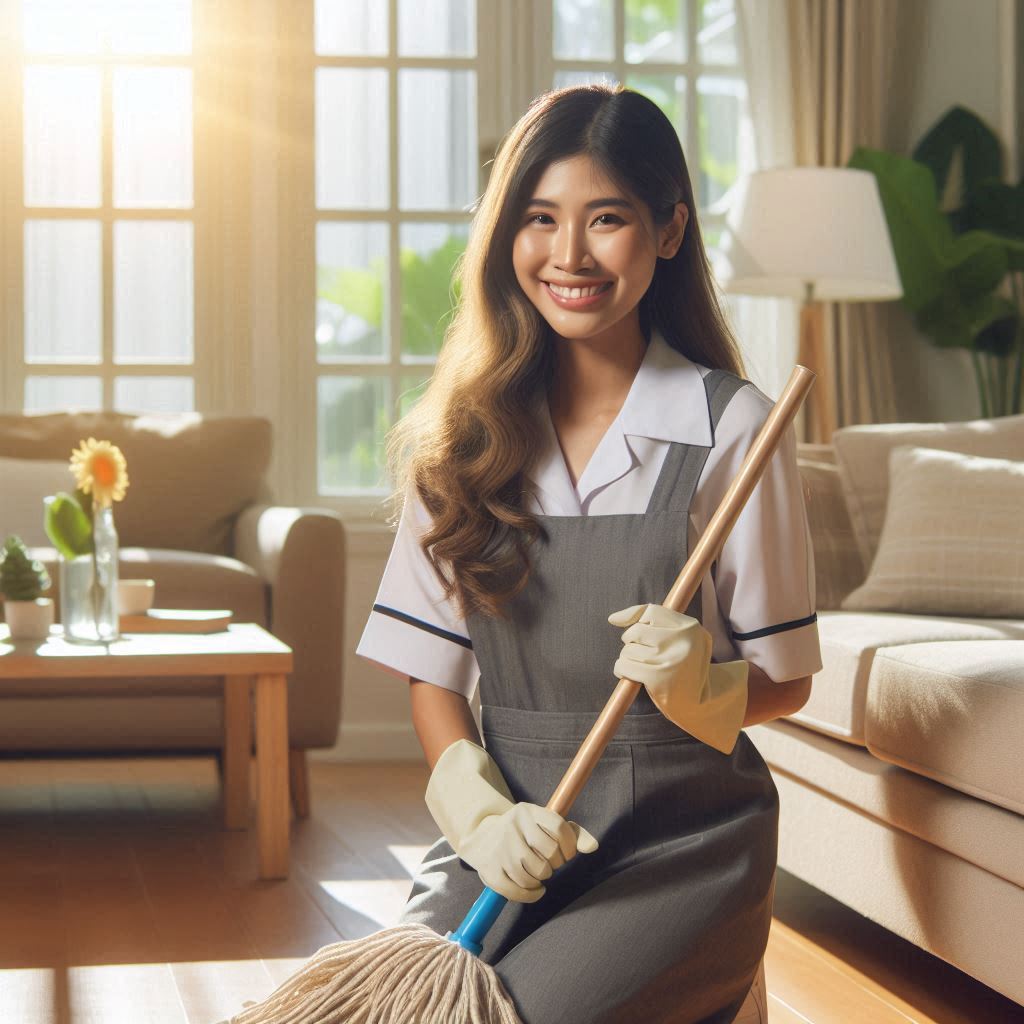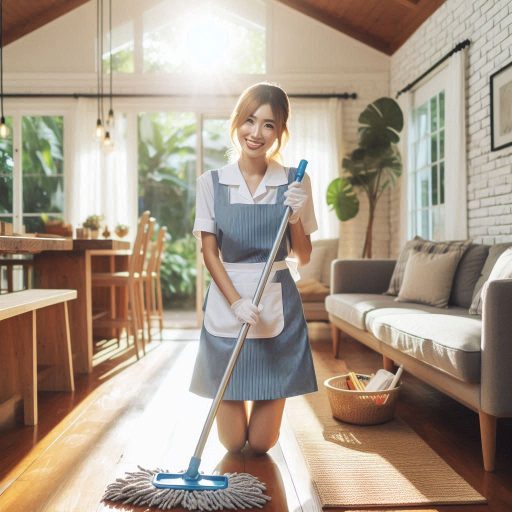Introduction
Proper training for housekeepers is essential in the USA’s hospitality industry, where high standards of cleanliness and service are paramount.
Housekeepers play a critical role in creating a welcoming atmosphere for guests, and their work directly impacts the overall guest experience.
Effective training ensures that housekeepers are well-equipped to meet the diverse demands of their roles, enabling them to perform their tasks efficiently and effectively.
When housekeepers receive proper training, they understand the best practices and standards that contribute to a clean and safe environment.
This knowledge is crucial for maintaining the reputation of hotels, resorts, and other hospitality establishments.
Enhanced training significantly improves the quality of service provided by housekeepers, leading to higher guest satisfaction and positive reviews.
Satisfied guests are more likely to return and recommend the establishment to others, creating a cycle of success.
Essential training covers a wide range of skills and knowledge necessary for efficient housekeeping.
Housekeepers learn vital time management techniques to prioritize their tasks effectively, ensuring that rooms are cleaned promptly and to a high standard.
They also acquire expertise in various cleaning techniques, including how to handle different surfaces, fabrics, and materials, which is critical for maintaining the integrity of hotel furnishings.
Importance of Cleaning Techniques
The significance of using proper cleaning techniques to maintain a clean and hygienic environment
Cleaning techniques play a crucial role in maintaining a clean and hygienic environment.
Housekeepers must understand the significance of proper cleaning methods.
Effective cleaning prevents the spread of germs and allergens, protecting the health of residents.
Using appropriate techniques ensures that surfaces are thoroughly sanitized and visually appealing.
The different types of cleaning methods and how they can be applied in various settings
Different cleaning methods cater to various environments.
For example, dry cleaning uses specialized equipment for delicate fabrics.
Wet cleaning employs water and detergents to remove dirt and stains from hard surfaces.
Steam cleaning uses high-temperature steam to eliminate bacteria and dirt without harsh chemicals.
Each method has its advantages and applications based on the cleaning needs of a specific space.
In residential settings, housekeepers should apply techniques tailored to the home‘s unique needs.
For example, using microfiber cloths on surfaces traps dirt effectively.
This method reduces dust and allergens while minimizing chemical usage.
Vacuuming carpets regularly helps remove dirt and prolongs the carpet’s life.
Utilizing proper techniques not only enhances cleanliness but also contributes to a healthier living environment.
In commercial spaces, cleaning techniques vary according to the type of facility.
For example, hospitals require stringent cleaning protocols to control infections.
Using disinfectants and proper techniques in patient areas is essential.
In contrast, office spaces may prioritize dusting and sanitizing high-touch surfaces.
Housekeepers in these settings must adapt their methods accordingly.
The importance of using eco-friendly cleaning products to ensure safety for both housekeepers and residents
The choice of cleaning products is just as important as the techniques used.
Eco-friendly cleaning products are vital for safety.
They minimize harmful chemical exposure for both housekeepers and residents.
Traditional cleaning products often contain toxic ingredients that can cause respiratory issues and skin irritation.
By choosing eco-friendly alternatives, housekeepers promote a healthier environment.
Many eco-friendly products are effective at eliminating bacteria and dirt.
Vinegar, baking soda, and essential oils can be used for various cleaning tasks.
These natural ingredients often outperform chemical cleaners while being safe for families and pets.
Housekeepers should familiarize themselves with these alternatives and how to use them effectively.
Training programs for housekeepers should emphasize the importance of cleaning techniques.
Educating staff on proper methods and eco-friendly products is essential.
Workshops can provide hands-on experience with various cleaning methods.
This training ensures that housekeepers can apply their knowledge effectively in different settings.
Ultimately, the significance of proper cleaning techniques cannot be overstated.
These methods protect the health and safety of everyone in the environment.
By using appropriate cleaning techniques and eco-friendly products, housekeepers contribute to a clean, safe, and healthy space for all.
Emphasizing the importance of these practices enhances the professionalism and effectiveness of housekeeping staff in any setting.
Read: Top Certifications for Advancing in Childcare Careers
Safety Procedures and Protocols
The essential safety procedures that housekeepers should follow to prevent accidents and injuries
Safety procedures are critical for housekeepers to prevent accidents and injuries.
Housekeepers must follow established protocols to maintain a safe working environment.
First, they should conduct a thorough risk assessment before starting any cleaning task.
This assessment helps identify potential hazards in the area.
Proper training on equipment use is also essential.
Housekeepers should understand how to operate cleaning machines and tools safely.
They must be aware of the appropriate handling and storage of cleaning products.
Clear labeling of hazardous materials is crucial for safety.
Housekeepers should also keep walkways clear of obstacles.
This practice prevents slips, trips, and falls, which are common workplace accidents.
Regularly inspecting cleaning areas for hazards helps maintain a safe environment.
Examples of common hazards in household cleaning tasks and how to mitigate them
Common hazards in household cleaning tasks include chemical exposure, slips, and equipment-related injuries.
For example, using bleach and other strong cleaners can lead to skin irritation and respiratory problems.
To mitigate these risks, housekeepers should read product labels and use chemicals according to the manufacturer’s instructions.
Wet surfaces can create slip hazards.
Housekeepers should place warning signs in wet areas to alert others.
They should also use non-slip mats in high-traffic areas.
Properly drying surfaces after mopping reduces the risk of slips.
Equipment-related injuries can occur if housekeepers do not use tools correctly.
For instance, improper lifting of heavy objects can lead to back injuries.
Housekeepers should follow proper lifting techniques and use carts or dollies to move heavy items safely.
The importance of wearing personal protective equipment (PPE) while performing cleaning duties
Wearing personal protective equipment (PPE) is vital for housekeepers‘ safety.
PPE includes gloves, masks, goggles, and aprons, depending on the cleaning task.
Gloves protect hands from harsh chemicals and allergens.
Masks reduce exposure to airborne particles and strong odors.
Goggles safeguard the eyes from splashes and chemical exposure.
Aprons keep clothing clean and offer an extra layer of protection.
Housekeepers should be trained on selecting and using the appropriate PPE for each task.
Encouraging a culture of safety within the workplace is essential.
Housekeeping teams should regularly review safety protocols and practices.
This culture fosters accountability and ensures that safety remains a priority.
Housekeepers must follow essential safety procedures to prevent accidents and injuries.
By understanding common hazards and using proper PPE, they can maintain a safe working environment.
Prioritizing safety not only protects housekeepers but also enhances overall cleaning effectiveness and quality.
Read: How to Balance Work and Personal Life in Childcare
Time Management Skills
The importance of time management for housekeepers to efficiently complete their tasks within given deadlines
Time management is essential for housekeepers to complete their tasks efficiently.
Proper time management allows housekeepers to prioritize duties and meet deadlines effectively.
In a fast-paced environment, housekeepers must manage their time wisely to ensure all tasks are completed thoroughly and promptly.
This skill is crucial for maintaining a clean and organized space, as well as for enhancing overall productivity.
When housekeepers effectively manage their time, they reduce stress and enhance job satisfaction.
They can focus on delivering quality service instead of rushing through tasks.
This approach leads to a more organized workspace, which benefits both housekeepers and residents.
Meeting deadlines fosters trust and reliability in the housekeeping team, essential for customer satisfaction.
Tips and strategies on how housekeepers can organize their work schedule effectively
Housekeepers can adopt several strategies to organize their work schedule effectively.
First, creating a daily checklist can help prioritize tasks.
A checklist ensures that no duties are overlooked and allows housekeepers to track their progress throughout the day.
Setting specific time blocks for each task can also enhance efficiency.
For example, dedicating 30 minutes for vacuuming and another hour for mopping can create a structured workflow.
Housekeepers should be realistic about the time required for each task to avoid unnecessary stress.
Additionally, grouping similar tasks can save time.
For instance, housekeepers can dust all surfaces in one area before moving on to another.
This method reduces the time spent switching between different cleaning activities.
Regularly reviewing and adjusting schedules based on workload can further improve efficiency.
The benefits of good time management skills in improving productivity and customer satisfaction
Good time management skills offer significant benefits, including increased productivity and improved customer satisfaction.
When housekeepers manage their time well, they complete tasks more efficiently.
This efficiency allows them to maintain high standards of cleanliness without sacrificing quality.
Moreover, effective time management leads to enhanced customer satisfaction.
Residents appreciate timely and thorough cleaning services, which contribute to a positive living experience.
When housekeepers consistently meet deadlines, they build trust and reliability, fostering strong relationships with clients.
Time management is crucial for housekeepers to complete tasks efficiently and meet deadlines.
By implementing effective scheduling strategies and prioritizing duties, housekeepers can enhance productivity.
These skills ultimately lead to improved customer satisfaction and a more organized work environment.
Read: Best Pet Grooming Schools in the United States
Customer Service and Communication
The significance of good customer service skills in the housekeeping industry
Good customer service skills are vital in the housekeeping industry.
Housekeepers often interact directly with residents, making positive impressions essential.
Exceptional customer service fosters a welcoming environment, enhances residents’ satisfaction, and builds long-lasting relationships.
When housekeepers demonstrate excellent service, they contribute to a positive experience for everyone in the facility.
Moreover, good customer service helps housekeepers address issues effectively.
When residents feel heard and valued, they are more likely to communicate their needs.
This open communication allows housekeepers to respond promptly and meet residents’ expectations.
Ultimately, strong customer service skills lead to increased resident retention and positive word-of-mouth referrals.
Examples of effective communication techniques that housekeepers can use to interact with residents and address their needs
Effective communication techniques are essential for housekeepers when interacting with residents.
First, active listening is crucial.
Housekeepers should give their full attention to residents, ensuring they understand their needs.
Nodding and making eye contact show engagement and respect.
Another effective technique is asking open-ended questions.
These questions encourage residents to share more about their needs and preferences.
For example, instead of asking, “Do you need anything?” a housekeeper might ask, “What specific areas would you like me to focus on today?” This approach fosters clearer communication and helps housekeepers provide tailored service.
Additionally, housekeepers should use clear and concise language.
Avoiding jargon ensures that residents fully understand the information being communicated.
For instance, when discussing cleaning schedules, housekeepers should provide straightforward explanations of what tasks will be performed and when.
The importance of maintaining a professional and friendly attitude towards customers
Maintaining a professional and friendly attitude is vital for housekeepers.
A positive demeanor creates a welcoming atmosphere for residents.
Smiling, greeting residents warmly, and using polite language can significantly enhance interactions.
Housekeepers should also remain calm and composed, even in challenging situations.
If a resident expresses dissatisfaction, housekeepers must respond with empathy and professionalism.
Acknowledging concerns and providing solutions demonstrates a commitment to customer service.
Moreover, a friendly attitude encourages residents to communicate openly with housekeepers.
This openness can lead to better service and stronger relationships.
When residents feel comfortable approaching housekeepers, they are more likely to express their needs and preferences.
Good customer service skills are essential in the housekeeping industry.
Effective communication techniques, such as active listening and clear language, foster positive interactions.
Maintaining a professional and friendly attitude towards customers enhances the overall experience and contributes to resident satisfaction.
By prioritizing these skills, housekeepers can create a supportive and welcoming environment for everyone.
Read: Finding the Right Work-Life Balance as a Nail Tech

Proper Handling of Equipment and Supplies
The proper ways to handle cleaning equipment and supplies to ensure their longevity and efficiency
Proper handling of cleaning equipment and supplies is crucial for ensuring their longevity and efficiency.
Housekeepers should be trained to use each tool correctly, following the manufacturer’s instructions.
This training helps prevent misuse, which can lead to damage and reduced effectiveness.
For instance, using the wrong cleaning solution with a specific machine can impair its functionality.
Regular inspection of equipment is also important.
Housekeepers should check for any signs of wear and tear, such as frayed cords or damaged hoses.
Addressing these issues promptly prevents further damage and maintains equipment efficiency.
Additionally, housekeepers should clean equipment after each use.
This practice prevents residue buildup and prolongs the life of the tools.
Guidelines on how to safely store and maintain cleaning tools to prevent damage and contamination
Safe storage and maintenance of cleaning tools are essential to prevent damage and contamination.
Housekeepers should designate a specific area for storing cleaning supplies.
This area should be dry, cool, and well-ventilated to avoid deterioration of cleaning agents.
When storing cleaning products, housekeepers should follow these guidelines:
Transform Your Career Today
Unlock a personalized career strategy that drives real results. Get tailored advice and a roadmap designed just for you.
Start Now- Labeling: Clearly label all cleaning supplies to ensure proper identification.
This prevents accidental use of the wrong product. - Secure Storage: Store chemicals out of reach of children and pets to ensure safety.
Use locked cabinets for hazardous materials. - Avoid Mixing: Never store chemicals near one another if they can react adversely when mixed.
This prevents dangerous situations and contamination. - Organized Storage: Arrange tools and supplies in an organized manner.
Keeping items grouped by type enhances efficiency during cleaning tasks.
Regular maintenance of equipment is also crucial.
For example, vacuum cleaners should have their filters cleaned or replaced regularly.
Mops and brooms should be washed to remove dirt and bacteria.
These practices ensure that cleaning tools remain effective and sanitary.
The importance of using the right equipment for specific cleaning tasks to achieve optimal results
Using the right equipment for specific cleaning tasks is essential for achieving optimal results.
Different tasks require different tools to ensure efficiency and effectiveness.
For example, using a high-powered steam cleaner is more effective for deep cleaning carpets than a regular vacuum.
Additionally, using specialized tools minimizes the risk of damage to surfaces.
For instance, using a soft microfiber cloth prevents scratches on delicate surfaces.
In contrast, using a harsh scrub brush on a sensitive area can cause irreversible damage.
Properly selected equipment also enhances the overall cleaning process.
For instance, a squeegee is ideal for cleaning windows, ensuring streak-free results.
Using the appropriate tool saves time and effort while producing the best results.
In summary, proper handling of cleaning equipment and supplies is crucial for their longevity and efficiency.
Following guidelines for safe storage and maintenance prevents damage and contamination.
Moreover, using the right equipment for specific cleaning tasks ensures optimal results, contributing to a clean and healthy environment.
Housekeepers should prioritize these practices to enhance their effectiveness and professionalism.
Understanding Different Surfaces and Materials
Educate housekeepers on how to identify different types of surfaces and materials in a household
Understanding different surfaces and materials in a household is essential for housekeepers.
Each material requires specific cleaning methods to maintain its quality and appearance.
Housekeepers should familiarize themselves with common household surfaces such as wood, tile, glass, fabric, and stone.
For instance, wood surfaces can be found in furniture, cabinetry, and flooring.
Tile surfaces are common in kitchens and bathrooms.
Glass surfaces include windows and mirrors, while fabrics are found in upholstery and curtains.
Stone surfaces, such as granite and marble, are often used in countertops.
Identifying these materials allows housekeepers to choose appropriate cleaning techniques.
Housekeepers should also learn to recognize the finish on surfaces.
For example, sealed wood surfaces differ in cleaning requirements from unfinished wood.
Similarly, polished stone requires different care than honed stone.
Knowledge of these distinctions ensures proper cleaning methods that prevent damage.
The appropriate cleaning methods for various surfaces to prevent damage and maintain their quality
Each surface requires specific cleaning methods to avoid damage and maintain its quality.
For wood surfaces, it‘s best to use a damp microfiber cloth with a gentle cleaner.
Excess moisture can warp the wood, so always dry the surface afterward.
Avoid using harsh chemicals that can strip the finish.
Tile surfaces can generally withstand stronger cleaners.
A pH-neutral cleaner mixed with warm water is ideal for routine cleaning.
For stubborn stains, a baking soda paste can be applied.
Always ensure that the grout lines are cleaned to maintain a uniform appearance.
For glass surfaces, a mixture of vinegar and water works well.
A squeegee can help achieve streak-free results.
Housekeepers should avoid abrasive materials that could scratch the glass.
When cleaning fabric upholstery, it‘s essential to check the care label.
Use a vacuum to remove dust and debris first.
For stains, a spot cleaner formulated for fabrics is ideal.
Testing any cleaner on an inconspicuous area first is wise to prevent discoloration.
Stone surfaces require gentle care.
Use pH-balanced cleaners specifically designed for stone.
Avoid acidic or abrasive cleaners that can etch or dull the surface.
Tips on how to tailor cleaning techniques based on the specific needs of different surfaces and materials
Tailoring cleaning techniques based on the specific needs of different surfaces ensures effective and safe cleaning.
Here are some tips for housekeepers:
- Know Your Products: Always read product labels for compatibility with the surface.
Using the wrong cleaner can cause damage. - Test in Small Areas: Before applying a cleaner to a larger area, test it in a small, inconspicuous spot.
This helps ensure no adverse reactions occur. - Adjust Tools: Use soft cloths or brushes for delicate surfaces.
Hard-bristled brushes can damage finishes or materials. - Consider the Environment: High humidity levels can affect some materials.
For example, wood can swell, so cleaning methods should be adjusted based on environmental conditions. - Regular Maintenance: Frequent cleaning helps maintain surfaces.
Establish a cleaning schedule that addresses different materials appropriately.
Understanding different surfaces and materials is crucial for housekeepers.
Identifying these surfaces allows them to choose the right cleaning methods, ensuring no damage occurs.
By tailoring cleaning techniques based on specific needs, housekeepers can maintain the quality and appearance of various materials effectively.
Infection Control and Hygiene Practices
The importance of infection control measures in housekeeping to prevent the spread of germs and diseases
Infection control measures are vital in housekeeping to prevent the spread of germs and diseases.
Housekeepers play a crucial role in maintaining a clean and safe environment for residents.
By implementing effective infection control practices, they can significantly reduce the risk of illness.
Proper cleaning and disinfecting minimize the transmission of pathogens, such as bacteria and viruses, which thrive in shared spaces.
In today‘s world, where health concerns are heightened, effective infection control is essential.
Many infectious diseases, including the flu and COVID-19, can spread easily in environments with high foot traffic.
Housekeepers must understand the importance of their role in breaking the chain of infection.
Regular cleaning and disinfection help protect both residents and staff, creating a healthier living space.
The proper hygiene practices that housekeepers should follow to maintain a sanitary environment
Proper hygiene practices are essential for housekeepers to maintain a sanitary environment.
Housekeepers should follow these key practices:
- Hand Hygiene: Regular handwashing with soap and water is crucial.
Housekeepers should wash their hands before and after cleaning tasks, especially after handling waste or cleaning high-touch surfaces. - Personal Protective Equipment (PPE): Wearing PPE, such as gloves and masks, protects housekeepers from exposure to harmful substances.
Proper use of PPE also prevents the spread of contaminants. - Avoid Cross-Contamination: Use separate cleaning tools for different areas. For example, designate specific mops and cloths for restrooms and kitchens.
This practice helps prevent the transfer of germs from one area to another. - Regularly Dispose of Waste: Proper waste disposal is essential to reduce contamination.
Housekeepers should empty trash bins regularly and ensure waste is contained in sealed bags. - Use of Clean Cloths and Tools: Always use clean and sanitized cleaning cloths and tools.
Dirty equipment can spread germs instead of removing them.
By adhering to these hygiene practices, housekeepers can maintain a sanitary environment that promotes health and well-being.
Guidelines on how to disinfect high-touch surfaces and frequently used areas to ensure cleanliness and safety
Disinfecting high-touch surfaces and frequently used areas is crucial for ensuring cleanliness and safety.
Here are some guidelines for housekeepers:
- Identify High-Touch Surfaces: Common high-touch surfaces include doorknobs, light switches, handrails, and remote controls.
Housekeepers should prioritize these areas during cleaning. - Use EPA-Registered Disinfectants: Select disinfectants that are effective against a broad spectrum of pathogens.
Ensure the product is registered with the Environmental Protection Agency (EPA) for safety and effectiveness. - Follow Manufacturer Instructions: Always follow the manufacturer‘s instructions for dilution and contact time.
Proper contact time is essential for effective disinfection. - Clean Before Disinfecting: Clean surfaces with soap and water before applying disinfectants.
This step removes dirt and organic matter, allowing disinfectants to work effectively. - Use Proper Application Techniques: Use disposable cloths or paper towels to apply disinfectants.
Ensure the surface remains wet for the recommended contact time for effective germ elimination. - Frequent Disinfection: Increase the frequency of disinfecting high-touch areas, especially during outbreaks of illness.
This proactive approach helps maintain a safe environment.
Infection control measures are essential in housekeeping to prevent the spread of germs and diseases.
By following proper hygiene practices and guidelines for disinfecting high-touch surfaces, housekeepers can create a clean and safe environment.
This commitment to cleanliness protects the health of residents and contributes to overall well-being.
Discover More: Efficient Scheduling for Service Industry Admin Assistants
Conclusion
Essential training for housekeepers plays a vital role in the hospitality industry in the USA.
It enhances their skills and knowledge, leading to improved performance in their roles.
Ongoing training ensures housekeepers stay updated on industry standards and best practices.
This commitment to professional development fosters greater confidence and competence in their work.
Housekeepers should actively seek opportunities for improvement and learning.
Continuous education empowers them to adopt new techniques and technologies that enhance their efficiency.
It also leads to higher quality service and increased guest satisfaction.
Moreover, consistent training helps reduce mistakes and enhances safety protocols in the workplace, protecting both staff and guests.
By prioritizing training, housekeepers contribute to a more effective and efficient hospitality environment.
Employers also benefit from investing in their staff’s professional growth, as it leads to lower turnover rates and a more skilled workforce.
Encouraging a culture of growth and development not only boosts individual careers but also strengthens the entire industry.
Let us champion continuous learning to achieve excellence in housekeeping practices and foster a commitment to high standards in all aspects of service.
Ultimately, ongoing training and professional development are essential for housekeepers to thrive and excel in their roles, ensuring a positive experience for every guest.




